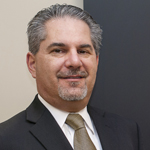Jason Groves has followed an unusual career path. He shares how always marching to the beat of his own drum landed him the career he always wanted.
» What I always tried to do was work within a triangle: new challenges and demands from customers, people, feasibility. It has been very important in my career to educate and train people—to take them by the hand and make sure they develop their own way of thinking, because it’s the only way you get decent feedback.
» My family has been a part of the military for generations. My dad is a West Point graduate and my grandfather was in the Army Judge Advocate General’s (JAG) Corp. My stepfather and brother were also Army officers.
» A majority of my childhood was spent in El Paso, Texas, but I went to high school in Germany, and I’ve spent a lot of time in New York. I define myself as a New York Texan. Texans are strong people; they work hard, get things done, and have a real cowboy mentality. I was brought up that way, and because you move around so much in military families, you learn to adapt to constant change. I learned to be comfortable being uncomfortable.
» I was raised to believe that if you work hard, immerse yourself, show up on time, and play the game, you’ll succeed in whatever you choose to do. For me, that’s just the way life is. You don’t complain, you build relationships, and in the end it all levels out. That’s the constant drumbeat I’ve been marching to for years and it’s always proven true.
» My grandfather is a lawyer and he has been a great influence on me, so I knew I wanted to follow his footsteps and become a lawyer. Most who pursue law think of the big three: being a judge, becoming partner, or becoming a general counsel. You think about it, but it’s not your only focus because it’s a long way away. For me, the climb was harder and longer than I anticipated.
» After law school I consulted with my grandfather. With his advice, I decided to join the Army JAG Corp. It was very competitive and deciding to join was a critical moment in my career. I served for three years and ended up with a medal for each year I served, which is unusual.
» After the Army JAG Corps, I did a short stint at a small, private firm for one year. It was mostly transitional as I waited for an opportunity to join Verizon, though not in the legal department. The general counsel at the time asked me if I wanted to be on the legal side or the policy side in the external and government affairs division. I had to figure out which was a better path to become general counsel. Thankfully, I made the right decision, somehow knowing that for me the future as a general counsel would include knowing more about policy and external affairs.
» Coming out of the JAG Corps, there weren’t many private-sector opportunities for me because I was seen as a government person. The year I spent at the small firm was tough, because I didn’t want to work that way. In the JAG Corps, the Army was my client. With Verizon, Verizon was my client. At the small firm, you’d have dozens of different clients, all of which were needed to sustain yourself. I learned what I liked and what I didn’t like; it gave me a better attitude and focus.
» I spent 10 years at Verizon. I first represented Verizon at the Federal Communications Commission and defended them against smaller carriers. It was easy to do, and I did it well. I was always a fan of politics and during this time I also volunteered my time to political campaigns. I even helped put together a charity golf tournament. A state senator came and was impressed with the tournament, so he asked if I’d be his campaign manager. I eventually spent eight years as a lobbyist and assistant vice president of government affairs for Verizon Maryland.
» As a lobbyist, the work is seasonal, so when I was done with my work in Annapolis, Maryland, I would do a lot of volunteer board work for several organizations, including hospitals and chambers. That’s how I met colonel Bradley T. MacDonald, the former chairman and CEO of Medifast. We went to a leadership academy together and became fast friends. He put me on the board of Medifast in 2009, where I served on the audit committee. When Brad became terminally ill in 2011, he asked his brother to take over as chairman, and I was named general counsel.
» To be general counsel, it’s absolutely required that you have knowledge of the law and business, but you also have to have knowledge of people, because it’s your job to provide guidance to your team. Being general counsel means you’re the ultimate responsible party for all business matters that intersect with law and regulations. It’s not just about being a good lawyer; it’s about moving the business forward through the complexities of growing regulations.

